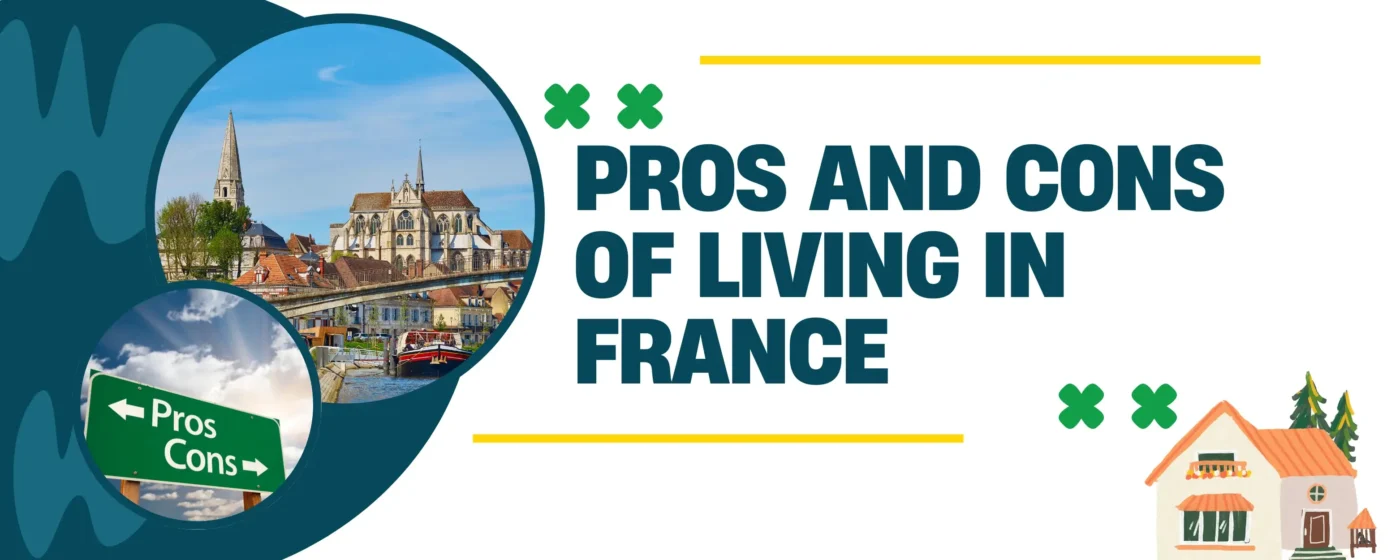Dreaming of waking up to the view of the Eiffel Tower from your window or maybe exploring the lavender fields of Provence during a long weekend? You’re not alone. France consistently ranks among the top destinations for expats worldwide, with hundreds of thousands choosing to call this beautiful country home. The attraction is obviously undeniable, with its rich culture, a world-renowned culinary scene and the melodic charm of the French language. If the idea of making France your new home has been swirling in your mind, you’ve come to the right place. This article will serve as your personal checklist, designed to make your relocation free of any possible hassles. Allez-y!
Key Takeaways
- Must know your passport is valid and obtain the correct visa and work permits before moving to France.
- Learn common French phrases, such as Bonjour, Merci, and S’il vous plaît aids daily communication.
- Know about Logistics and Packing Tips France Checklist, such as Organising Your Belongings, Shipping and Moving Services, etc.
- Understand to open a French bank account with the necessary documents to facilitate financial transactions.
- Register with the local mairie, understand public transport, and immerse yourself in French culture for smoother integration.
Moving to France Checklist: Preparing for the Move
1. Gathering Essential Documents
Your first crucial step involves ensuring you have the necessary paperwork. Your documentation will form the basis of your move to France! Begin by checking the validity of your passport – it should ideally have at least six months of validity beyond your intended stay in France. Depending on your nationality and the purpose of your move (tourism, study, work, or long-term residency), you will need to investigate the specific visa requirements. It is important to understand the different types of visas—such as short-stay visas, long stay visas, and residence permits—and the associated legal requirements for entering and residing in France.
If you plan to work, you’ll need a work permit, often sponsored by your employer. The visa application process requires gathering necessary documents, including birth certificates, and you will typically need to apply from your home country. Don’t forget to book a comprehensive travel insurance to cover any unforeseen medical or travel-related issues.
2. Learning Basic French Phrases
While you can get by as a tourist in France without knowing the language, it’s not the case when you think of relocating there! Making an effort to learn rudimentary French phrases will significantly enhance your daily life and interactions. Knowing how to say “Bonjour” (Hello), “Merci” (Thank you), “S’il vous plaît” (Please), and “Excusez-moi” (Excuse me) will go a long way in facilitating smoother communication in shops, restaurants, and other everyday encounters.
There are numerous accessible ways to start learning the French language. You can utilize user-friendly language learning apps, enroll in online French courses, if you wish to learn French at your own leisure pace. However, you must consider platforms like La Forêt French Class for structured lessons and a better language understanding.
Planning a trip to France? Don’t miss these essential travel tips to France every tourist should know for a smooth journey.
Logistics and Packing Tips: Your France Checklist
1. Organizing Your Belongings
Moving internationally is an excellent opportunity to declutter your wardrobe. Go through your belongings and decide what is truly essential and what you can leave behind, sell or even give away to your friends. When deciding what to bring to France, consider the climate of the region you’ll be living in and pack weather-appropriate clothing.
Don’t forget essential electronic adapters for your devices, since France uses a different plug type (Type E). Pack enough personal items like medications and toiletries to last you until you get settled, since it might take some time to find your preferred brands in France. Being able to speak French is essential for navigating everyday life in France, from shopping to socializing with neighbors, and will greatly enhance your daily life and interactions.
2. Shipping and Moving Services
Choosing a reliable international shipping company is important for a smooth relocation. Look up and compare several companies. Pay attention to their experience with moves to France, customer reviews, and the range of services they offer (packing, door-to-door delivery, insurance).
Obtain detailed quotes from multiple providers to understand the costs involved, which can vary significantly based on volume and destination. Be sure to also inquire about customs regulations in France, as you may need to complete specific paperwork and potentially pay import duties on your belongings.
Healthcare and Insurance: What You Need to Know?
When moving to France, understanding the healthcare system is one of the most important aspects of your relocation checklist. France boasts a world-renowned public health system that provides high-quality medical care to residents and expats alike. To access the majority of healthcare services, you’ll need to apply for a carte vitale, which serves as your key to the French public health system and ensures you receive reimbursements for medical expenses.
While the public system covers a significant portion of healthcare costs, many expats and French people choose to supplement their coverage with private health insurance, known as “mutuelle.” This additional insurance can help cover expenses not fully reimbursed by the public system, such as dental care, vision, and private hospital stays.
Taking the time to secure the right health insurance will give you peace of mind and ensure your family’s well-being as you start your new life in France.
Explore the breathtaking beauty of iconic landscapes in this guide to the Natural Wonders of France worth visiting.
Settling In: What to Do Upon Arrival
1. Securing Housing in France
Finding accommodation is a crucial step in your move. Most people and expats moving to France tend to settle in popular cities such as Paris, Marseille, Lyon, and Strasbourg, which are considered the most popular cities among newcomers. Renting in France usually involves signing a lease agreement (bail), paying a security deposit (caution), and providing documents like your passport, visa (if applicable), and proof of income. Be prepared for potential guarantor requirements if you lack a French income history.
You can kick-start your housing search early using various platforms. Real estate agencies (agences immobilières) can assist you, but they often charge fees. You can also explore popular websites like SeLoger, Leboncoin, and Logic-Immo. Additionally, consider checking local online forums and expat groups on Facebook for potential leads and shared accommodation options. Both furnished and unfurnished apartments are widely available in France. Happy maison-hunting!
2. Opening a French Bank Account
Having a local bank account will greatly simplify your financial life in France. Bank accounts are essential for managing your finances, making cash withdrawals, and paying bills. It allows for easy direct debits for recurring expenses like rent, utilities, and internet bills. It’s often required for receiving salary payments if you are employed.
Typically, to open a French bank account, you’ll need to provide your valid passport, proof of your French residence (such as a utility bill or rental agreement), and if applicable, your work contract or proof of employment. Some banks may also have additional requirements, so it’s advisable to check with the specific banking institution beforehand.
A Wise account is a free and convenient option for international transfers and managing multiple currencies before you open a local account.
3. Registering with Local Authorities
Registering at the local mairie (town hall) is often required for certain administrative tasks and can help you better integrate into the community. If you plan to drive in France, you will need car insurance and, for non-EU/EEA nationals, an international driving permit. You may also need to exchange your foreign driver’s license for a French one, depending on your country of origin. Additionally, obtaining a Carte Vitale is crucial for accessing healthcare in France. This health insurance card will allow you to receive reimbursements for medical expenses. Look up the specific steps for registration at your local mairie and the process of applying for your Carte Vitale as soon as you settle in.
4. Understanding the French Job Market and Finding Jobs
The job market in France varies by region and sector, with language skills playing a significant role in employment opportunities. Expats moving to France should research the local job market and use resources such as job boards, recruitment agencies, and networking events to find jobs. Popular websites and multinational companies can also help newcomers secure employment.
Explore the elegance and innovation of French car brands in 2025 through our detailed guide on the top automotive names.
Experience France, Learn the Language!
Discover hidden gems with our language and culture insights. Explore with us!
Adjusting to Life in France and French Culture
1. Navigating Public Transportation
France has an efficient public transportation system. Major cities have extensive metro and bus networks, making daily commutes convenient. The average temperature and climate can vary significantly between regions and cities, including the capital city, Paris, which may influence your daily travel experience. The train system is excellent for traveling between cities and regions. Paris, as the capital city, is a major transportation hub, making it easy to connect to other parts of France and Europe. To save money and time, you should definitely consider purchasing weekly or monthly travel passes if you plan on using public transport frequently within a city.
Many cities also have dedicated transport apps that allow you to plan your journeys, check schedules in real-time, and even purchase tickets directly from your phone! You can explore these options upon arrival to find the most suitable and cost-effective solutions for your travel needs.
2. Adapting to French Culture
Integrating into French society goes beyond practicalities and textbook learning. Embracing the local culture is essential for a fulfilling experience. There are a whole host of cultural experiences, festivals, and traditions to explore in France. Take the time to learn about French customs and traditions. Simple gestures like a polite “Bonjour” upon entering a shop can make a significant difference.
Be mindful of dining etiquette, such as waiting for everyone to be served before starting to eat. Familiarize yourself with French holidays and local festivals to participate in community events. Showing genuine interest in the French way of life will be warmly received and help you feel more at home.
To make your relocation journey even smoother and more enriching, consider exploring La Forêt French Class to master the French language. Bon courage!
Did You Know?
- In France, most small shops and businesses close on Sundays, especially outside of major tourist areas. This is a time for family and relaxation, so plan your grocery shopping accordingly!
- While France is known for its complex administrative processes (often called “la paperasse”), there are expat communities to help you navigate through the chaos. Patience and persistence are key!
- The French take their bread seriously, yes! Freshly baked baguettes are a staple of French life, so don’t be surprised to see people walking home with one sticking out of their bag. There are even laws regulating the quality and ingredients of traditional French bread. Oh la la!
Frequently Asked Questions
1. What’s the process for bringing my pet to France?
Ans: You’ll need to ensure that your pet has a microchip, a valid rabies vaccination, and an EU pet passport (or an official veterinary certificate from your country). Specific regulations can vary based on your country of origin, so do appropriate research beforehand.
2. Can I use my existing driver’s licence in France?
Ans: For a limited period, usually up to a year, you can drive with your foreign driver’s license if it’s valid. After that, you’ll need to exchange it for a French license.
3. How do I set up a French mobile phone plan?
Ans: You’ll typically need a French bank account and proof of address to set up a mobile phone contract. Prepaid options are also available if you prefer not to commit to a long-term plan initially.





